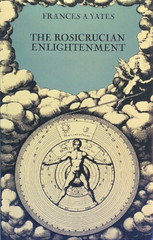The suggestion of hidden knowledge, which all sorts of secret societies thrive on, is deeply fascinating to me. I am a perfect target for the
suggestion of knowledge, the hints and cryptic allusions. And I'm an academic, an atheist, a sometime cynic. I know it is nonsense. But the fascination lies in the
stories. And I'm a sucker for a good story.
At the centre of all the mystical posturing of the Freemasons, and all the others of the same ilk, is the myth of the Rosicrucian Society. It is tantalising in its vagueness and its reference to harmonies, orders and secret knowledge. But the trouble with allusions to vast secret knowledge is that when you look at it more closely it inevitably turns hollow, boring -- all silly ritual and vagueness.
This is where Frances A. Yates comes in. And I love her for it. She retains the excitement of finding out "what it is all about" by cutting through the high-flying nonsense and grounding it in real historical development. I am aware that the illusion of getting to the Truth of the matter is again illusory, but I much prefer this illusion to the intangible secret society one; and since I am not reading this academically but in order to learn something for fun, I am not unhappy with her turning the birth of the Scientific Revolution into a Grand Narrative. It is a much better one than the myth that Science grows whole and pure, based in Rationality alone, from the Deep Dark of the Middle Ages.
Yates' thesis is that the Rosicrucian Manifestos (which she analyses in some detail) are allegories about, or at the very least allude strongly towards, the Palgrave (or Elector Palatine) Fredrick V, based in Heidelberg, who married Elizabeth Stuart, the daughter of James I (and VI, mustn't forget Scotland), and made a bid for the throne of Bohemia (which he gained, and then lost again in 1620, which earned him the name of ``Winter King'', as that was how long he had reigned). Those vaguely familiar with the Thirty Years War will recognise the importance of this. It then goes further, and combines dynasty politics with intellectual history and scientific development. Heidelberg was, after all, once of the great centres of European learning.
I freely admit that part of the reason why I love this book is that it is based in precisely the type of history-writing I adore. I don't want to read about farmers and fishermen. I want kings and queens, dynasty politics, religious intrigue, great thinkers and
stories. There are limits to the stories you can tell about the farmers and fishermen. And, perhaps more importantly, it is all about the pleasure of recognition. Part of the appeal is the connection made between two parts of history which I have always approached separately.
I tend to compartmentalise history. I think of James I/VI and I think
Macbeth and Shakespeare, Gunpowder Plot, Francis Bacon and his position between Elizabeth I and Charles I. Thinking of the movements in Europe at the same time, my mind runs to the religious conflicts, the Habsburgs, Bohemia, the (second) Defenestration of Prague and the Thirty Years' War. Similarly, Scandinavian history in my mind has got its own separate box, and there is another for the Mediterranean. I always get a rush when I get to join them up and see how they fit together. I suppose that makes me a geek.
Yates envisions the Palatinate as a link between the developments in England and those in Bohemia. She makes a very convincing case for this link, basing much of it in the figure of John Dee, a major English mystic. This book is only one in a number of studies she has made of the esoteric tradition(s) in Europe in combination with the seeds of the Enlightenment. The weak point, I suppose, is that tendency to want to make the whole of it into
one tradition. The influences she traces are very persuasive, and while I sometimes felt that she read too much into a detail, the thesis as a whole is terribly seductive. Certainly to me.
It could be that her way of writing appeals to me so much because it is reminiscent of literary interpretation. In fact, much of it
is literary interpretation. She traces references to Spenser (after grounding him in the Order of St. George), and this mix of literature and history not only triggers a number of my intellectual pleasure points, it paints a delicious swirl of colour around what is too often presented as a black and white, dreary story of Progress of Mind, bringing Kepler, Newton, Descartes and the like down to
history from the rarefied heights of scientific development. All the while tracing the development of the story of the Rosicrucian Order (or the Brotherhood of the Rosy Cross) in its changing manifestations.
I love it.


Comments